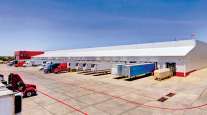Swift Expands Refrigerated Service in $225 Million Purchase of Central
This story appears in the Aug. 12 print edition of Transport Topics.
Swift Transportation Co. said it acquired Central Refrigerated Service for $225 million, a move that officials said will significantly expand Swift’s temperature-controlled truckload business.
Central — the fifth-largest refrigerated truckload carrier in the United States — generated $504 million in revenue and $50 million in earnings before interest, taxes, depreciation and amortization in the 12 months ended June 30. The company is based in West Valley City, Utah, and was majority owned by Swift CEO Jerry Moyes.
The combination of the refrigerated businesses is expected to make Swift one of the nation’s largest temperature-controlled truckload carriers.
“It makes perfect sense for Swift and Central to combine their businesses at this time,” said Richard Stocking, president and chief operating officer of Phoenix-based Swift. “Our customers are looking for comprehensive solutions to their transportation needs, and this combination will enable us to better serve them.”
Central Refrigerated was spun off in 2002 from Central Freight Lines, a regional less-than-truckload carrier based in Waco, Texas, and which also was owned by Moyes until 2010.
Swift, a publicly traded company listed on the New York Stock Exchange, ranks No. 7 on Transport Topics’ Top 100 list of the largest for-hire carriers in the United States and Canada, while Central ranks No. 56.
Swift’s move comes less than a month after the owner of KLLM Transport Services announced plans to buy all of the outstanding stock of Dallas-based Frozen Food Express Industries for $38.2 million.
FFE and KLLM rank No. 6 and No. 7, respectively, on the TT100 list of largest refrigerated carriers, and the companies together would be the third-largest refrigerated carrier in North America with combined 2012 revenue of more than $740 million.
A special committee of four independent members of Swift’s board of directors negotiated with the stockholders of Central. Under terms of the purchase, Swift will pay $189 million in cash and take over $36 million in capital lease obligations and other debt.
Swift board member William Post, who headed the special committee, said the company looked at alternatives, such as expanding Swift’s existing refrigerated fleet or acquiring other companies, before deciding to proceed with the purchase of Central.
“We are pleased to be acquiring a growing and profitable business at an attractive valuation,” Post said. “This acquisition will allow Swift to be an immediate player in the over-the-road temperature-controlled market.”
C.R. England Inc. is the largest carrier in the refrigerated sector with annual revenue of $1.42 billion, followed by Prime Inc. with revenue of $1.15 billion, according to rankings by Transport Topics.
Swift officials said they expect 4% to 5% annual growth in the number of trucks providing temperature-controlled transportation. The company estimated that about 2 million trucks are used to serve a market of about $7 billion to $8 billion in transportation spending.
Increased demand is coming, in part, from a rise in outsourcing of trucking services, Swift said, along with growth in pharmaceutical, health care and consumer goods shipments in the United States.
Central provides linehaul, dedicated, freight brokerage and intermodal services with a workforce of 1,800, including 1,322 drivers. Major customers include Kraft Foods, MillerCoors, Wal-Mart Stores, McClain Foods and Nestle. The company operates terminals in Utah, Colorado, California and Georgia.
Swift said revenue from refrigerated truckload services, on a pro forma basis in 2012, which combines Central’s business with Swift’s for that time period, was $680 million, or about 17% of total revenue of $4 billion.
Following the acquisition of Central, Swift said its fleet consists of 12,200 company-owned tractors, about 4,100 owner-operator tractors, 52,200 trailers and 8,700 intermodal containers with 35 major terminals in the United States and Mexico.




